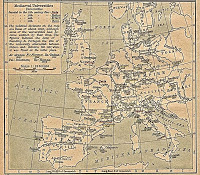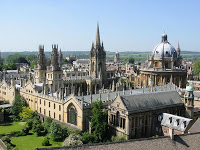It’s something of a misnomer to speak of Medieval Europe as somehow benighted, and the so-called “Dark Ages” were only dark in comparison with the Roman Empire that preceded them. They were, in fact, still spreading knowledge and educating students, and in more subjects than simply Aristotle and Canon law.
As early as the 11th century– before the end of the Viking Age– what we now call Universities were being founded in places such as Bologna and Oxford. By the 15th century nearly 90 universities were in operation across Europe, and each was open to students from across Europe and was known as a studium generale (differentiated from the studium particulare, which only catered to local students). To put this into an RPG perspective, that would put a university in roughly all of the named towns and cities on the World of Greyhawk map, and some of the largest cities would sport several.
The curriculum in those early universities, and the nature of the universities themselves, varied. Some, such as the great studium in Genoa, was organized by, and under the control of, the students, who paid for everything. In Paris the reverse was true; the teachers ran the show. Others were paid for by the church, and their curriculum would naturally reflect this. Still others were under royal patronage, such as the universities at Oxford and Cambridge.
 The curriculum, broadly speaking, consisted of liberal arts, law, theology, or medicine. Students would enroll at the age of 14 or so, and courses would be built around the study of a single book; whether it be a book of law, medicine, etc. The liberal arts were composed of arithmetic, geometry, astronomy, music theory, grammar, logic, and rhetoric. Students who underwent the complete six-year curriculum were awarded the title of Bachelor. Those who continued their studies in law, medicine, or theology could continue on to the ranks of Master and eventually Doctor. Teachers in one school could teach at any other without examination, and the schools as a whole had a certain degree of autonomy, within the context of their financing and reputation, of course. In one famous case, striking students didn’t just leave the university, they left the entire city for several years! So the universities definitely had some political and economic clout.
The curriculum, broadly speaking, consisted of liberal arts, law, theology, or medicine. Students would enroll at the age of 14 or so, and courses would be built around the study of a single book; whether it be a book of law, medicine, etc. The liberal arts were composed of arithmetic, geometry, astronomy, music theory, grammar, logic, and rhetoric. Students who underwent the complete six-year curriculum were awarded the title of Bachelor. Those who continued their studies in law, medicine, or theology could continue on to the ranks of Master and eventually Doctor. Teachers in one school could teach at any other without examination, and the schools as a whole had a certain degree of autonomy, within the context of their financing and reputation, of course. In one famous case, striking students didn’t just leave the university, they left the entire city for several years! So the universities definitely had some political and economic clout.
From an RPG perspective, not only are these universities the logical place to find sages in any one of the various specialties, but also could form a part of a player character’s background or even current activities. Adding magical studies (the ars magica) as one of the core curricular subjects would certainly not be out of order in most campaign settings, and might even form the basis for starting off new parties. The rather staid “You all meet in a tavern…” could be replaced with the somewhat more realistic “You all know each other from the university, having progressed in different courses of study, but becoming good friends during that time…”
In the Adventures Dark and Deep game specifically, it would be completely apropos to say that bachelors would perforce have one of the various specialties within the scholarship secondary skill, or perhaps even generalship, alchemy, etc. Different universities might offer different specialties.
It certainly seems that universities could add quite an element of verisimilitude to a campaign set in a quasi-Medieval setting, as well as providing justification for previous relationships and the acquisition of new knowledge. Give it a go!











Here-here. The darkening of the Middle Ages is a chestnut that needs roasting.
Very true. Even as early as the late 1290's Scotland, long considered a backwater, already had colleges of learning at Dundee, Inverness and Saint Andrews (though no universities yet). By the 15th century, the tiny country had universities at Aberdeen, Glasgow, Edingburgh and Saint Andrews.
Well said, and especially since recent years have seen some stretching the term Dark Ages from Rome all the way to the Enlightenment. Rubbish.
It's worth noting that there were some serious flowerings of knowledge and culture throughout the 'dark ages', but by the time you mention, the whole process was beginning to take shape.
In terms of D&D, that's where our party largely came from. The main NPC – a Cleric – was on a quest and came by the university of Verbobonc to research, there discovering several of the PCs in one form or another. So it does work, and also gave at least a couple of them access to information due their studies.
Well, to be honest and fair, the term "Dark Ages" is relative.
The Arabs and Saracens retained much of Greece and Rome's "knowledge," in comparison with Europe in general and that's really where the term comes from.
I like Kevin Coster's "Robin Hood" as an example, when Morgan Freman's character pulls out his "telescope." The middle east retained such knowledge, while Europe had "lost" it.
Then there' Tyrone Powers' "The Black Rose," where his character travels all the way to Kublai Ghans' lands and returns with the compass, among other things.
I don't think anyone of "education" meant to imply that people were absolute idiots during the "Dark Ages," merely that the people living in Europe had lost much of their former knowledge, given that they too had been a part of the Roman Empire.
Be that as it may, I love the fact that you've high lighted these points and facts for us. It's how I like to play my Greyhawk Pathfinder as well.
Magical schools may be "rare" (in my game), but "standard" colleges are certainly more numerous'
I generally shy away from Magic Schools because IMO they would lend themselves to making mages a hegemony. I prefer keeping the study of magic on an apprentice-master basis with a few students gathering around a particular wizard for their schooling.
Having a faculty of high level mages seems to me to run the risk of creating power bases that, even in a fantasy setting, can become way too powerful. Or am I simply over thinking this? I do like the idea of the "ars magica" being a course of study in a university. Perhaps as pre-apprentice classes that, once mastered, clears the way for the student to apply for a formal apprenticeship with a wizard? (Kind of like showing that the prospective student has his bona fides in order and has been found to have promising potential in the study of magic?)
While I also prefer the master-apprentice dynamic for magic I can easily see a wizard being asked to teach one of the other arts and then discovering amongst the students several promising apprentices. Then once he's passed away his apprentices remain at the university, finding and teaching their own apprentices within the student body. In time the university could become known as a place to go to learn the ars magica.
The other thing I see the university being good for is explaining the presence of mid-to-high level NPC who are not adventurers.
I can see the point you're making, Gray Mouser, but I give you the Assassins:
http://en.wikipedia.org/wiki/Assassins
The order of Nizari Ismailis wielded just such a "power base" as you mention. So it's not unprecedented in our own world.
However, I don't see Schools of Magic wielding such influence simply — at least, not in my game — because the Magicians would lack the political motivation for such.
Assuredly there would be individuals who lusted for such power — Vecna comes to mind. But for the most part, I see wizards as lacking such a motivational drive.
Mystic Scholar, I would just point out that Magic-Users are one of the few classes in 1e that can specifically clear territory, build a castle and attract townspeople. That, to me, gives the class a built in *potential* for political motivation. Add to this the fact that at high levels Magic-Users are quite powerful and the local magic school is only a few steps away from being a recruiting center for a "Magocracy."
The apprentice-master relationship effectively deals a blow to the possibility of mages coming together to form an unbeatable power base, as does the picture EGG paints of them in the DMG under Acquisition of Spells. Alignment aside, Magic-Users are selfish and self-centered. But that's what keeps them from going from a major threat to an unbeatable one IMO.
good post, although I'd clarify a couple of points
first, there were no true 'universities' before about 1200 (not in the 11th century), although cathedral schools under the tight supervision of local bishops flourished from the late 10th century (Abelard taught at a number of cathedral schools).
also all the early universities were essentially church institutions, even if direct episcopal control had ceased. After all, all teachers were churchmen, and all students were considered to have entered minor orders (and thereby earned the privileges and exemptions of all clergy) – even if they were 13 year old boys and interested in wine, women and song.